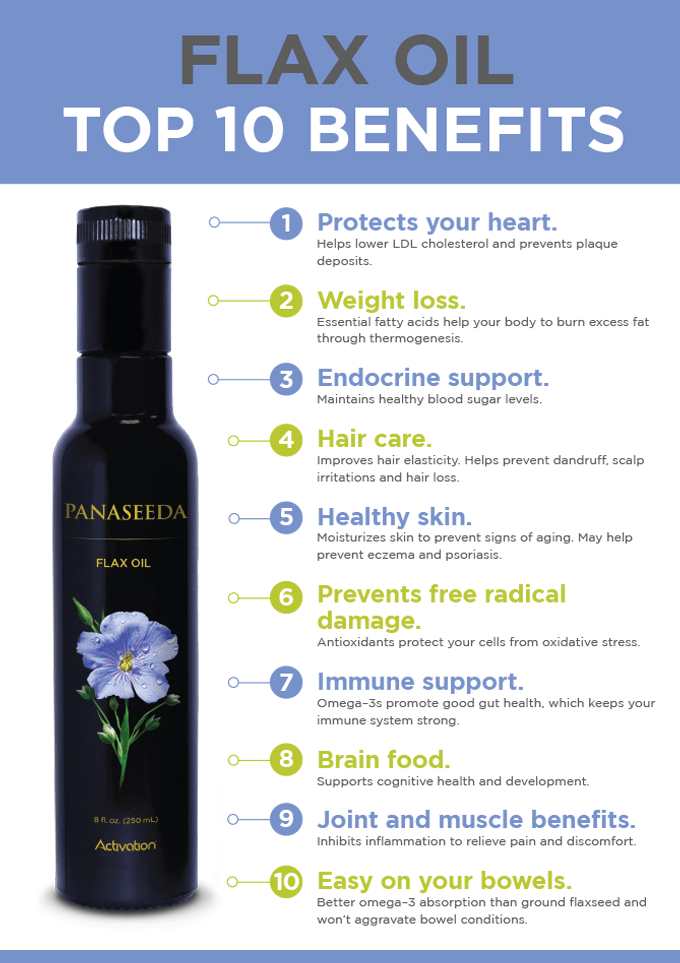The Top 10 Benefits of Flax [LIST]
Flaxseeds were one of the world’s first cultivated superfoods; they have been called one of the most powerful plant foods on Earth. Impressive, considering their minuscule size.
They’re known to heal the intestines, improve skin conditions, increase energy and enhance your overall health.
They have so many benefits it’s not surprising these little golden seeds were worshiped through the centuries for their seemingly ‘magical’ properties.
In the Middle Ages, King Charlemagne was so passionate about flaxseeds for good health that he actually passed a law ordering all loyal subjects to eat them regularly!
This seed is a powerhouse; it contains omega-3 fatty acids, lignans and fiber, as well as other nutrients like protein, copper, zinc, magnesium, selenium and vitamin B1.
Top 10 Health Benefits of Flax:

1. Protects Your Heart
According to Herbwisdom.com: “Several studies indicate that flaxseed oil, as well as ground flaxseed, can lower cholesterol, thereby significantly reducing the risk of heart disease.”. Left untreated, high cholesterol can cause clogged arteries, leading to a heart attack or stroke.
One of the best ways to help prevent heart disease is to maintain a diet low in saturated and trans fats, yet high in unsaturated fats.
Flax is rich in healthy fats and it has other key nutrients that are important for keeping your heart in tip-top shape too.
The lignans in flax prevent plaque deposits in your arteries by keeping white blood cells from sticking to blood vessels’ inner linings.
The alpha-linolenic acid (ALA) in flax oil also protects blood vessels from inflammatory damage.
According to Dr. Edward Group at Global Healing Centre, “The risk of heart disease is lower in individuals who take flaxseed oil. Evidence indicates that those who eat a lot of ALA are less likely to suffer a fatal heart attack and it reduces high blood pressure.”
2. Balances Blood Sugar
Daily flax intake can improve blood sugar levels. It contains alpha-linolenic acid, protein and fiber which are all crucial for controlling blood sugar.
Flaxseeds also contain both soluble and insoluble fiber. Soluble fiber can help lower blood sugar levels by slowing the absorption of glucose through the small intestine. Slowing glucose absorption stabilizes blood sugars and prevents the increase that can occur after eating.
Maintaining normal blood sugar levels prevents complications such as kidney failure and also reduces the risk of heart disease and stroke.
3. Supports the Digestive System
Flax is high in fiber which is essential for a healthy digestive system. It contains both soluble and insoluble fiber. Fiber improves the movement of food throughout the intestines.
The mucilaginous fiber in flax also makes it easier for your intestines to absorb nutrients. This soluble fiber dissolves in water and creates a gel-like substance, keeping the stomach full for a longer time.
The fiber and mucilage content in flax also soften and bulk up stool which allows it to pass through the colon more easily. This can alleviate pain and discomfort caused by constipation.
Proper digestion is important for the overall absorption of nutrients. If your intestines are healthy, then you’ll have good overall nutrient absorption.
With its high omega-3 content, flax can also improve inflammatory digestive disorders. Omega-3s are naturally anti-inflammatory, which can reduce the pain associated with conditions like irritable bowel syndrome (IBS).
4. Provides Menopausal Support
Flax can sometimes ease the symptoms of menopause. Lignans in flaxseeds have estrogenic properties, which assist with symptoms like hot flashes, mood swings and vaginal dryness.
The hormone-balancing lignans and plant estrogens in flax can assist in stabilizing your ratio of estrogen and progesterone.
Flax can also even out your menstrual cycle, keeping it regular and promoting fertility.
The essential fatty acids in flax can block the production of prostaglandins, which are a type of hormone. When released in excessive amounts during menstruation, they can cause heavy bleeding.

5. Stimulates and Promotes Weight Loss
There are three important components of flax that can assist with weight loss: omega-3 fatty acids, fiber and lignans.
SuperfoodProfiles.com outlines the benefit of using flax oil for weight loss: “Taking flaxseed oil regularly is believed to improve metabolism and increase thermogenesis (fat-burning). Thermogenesis is a very beneficial process for weight loss wherein specialized brown fat cells increase their fat-burning capabilities. Ironically, one of the best ways to stimulate thermogenesis is by eating more essential fats, like those found in flax.“
A study published by the Journal of Nutrition showed that supplementing with flaxseeds may ameliorate obesity. Another study, in Nutrition Journal, demonstrated that flaxseeds are an important nutritional addition to a weight loss diet especially for individuals with cardiovascular problems.
Flax also contains zinc, potassium, magnesium and B-vitamins which are all useful for promoting weight loss. The nutrients in flax can also reduce inflammation; an inflamed body tends to hold onto excess weight.
6. Strong, shiny hair
Flax, as mentioned, is rich in omega-3 fatty acids, which can nourish your hair follicles to make them strong and healthy. Omega-3 fatty acids increase hair’s elasticity, making it less prone to breakage.
Sabrina Perkins at NaturallyCurly.com points out that: “the oil does contain both omega-3 and omega-6 fatty acids, which are both needed for health. People who are lacking in those necessary essential fatty acids may experience dry, brittle strands. Omega-3 fats nourish the hair follicles and encourage growth.“ She goes on to recommend using flax oil as a hair mask, demonstrating that flax can improve your hair both when consumed and used topically.
The vitamin E in flax provides nourishment to hair roots and the scalp and can even help prevent baldness. It can also help restore growth in cases of psoriasis-related hair loss.
Flax is full of other nutrients like protein, calcium, zinc, magnesium and iron, which are all required for the growth of your hair.
The anti-inflammatory properties of flax can alleviate dandruff, eczema and other scalp conditions. It prompts the production of sebum in the scalp, preventing flaking and dandruff.
7. Moisturizes Skin
Flax contains several skin-friendly nutrients that can help to improve the health of your skin. Flax oil can be added to skin care products like shower gels and lotions. The essential fatty acids in flax keep the skin hydrated and moisturized.
Regular intake of flax can increase the body’s natural oil production, keeping the skin soft and supple. It can prevent irritants from entering your pores and it locks moisture into the skin, keeping dryness at bay. Well-maintained and moisturized skin can also delay the onset of fine lines and wrinkles.

8. Joint and Muscle Mobility
Inflammation can be caused by an omega-3 fatty acid deficiency. Omega-3 fatty acids are key for fighting inflammation in the body.
ALA and lignans found in flax may reduce inflammation by preventing the release of pro-inflammatory agents. Reducing inflammation can mean fewer aches and pains in your joints and muscles.
9. Cellular Health
Studies supported by the American Institute for Cancer Research indicate that there is a link between flax and reduced risk of cancer.
According to Top10HomeRemedies.com, these studies unearthed surprising and impressive results: “Initially, it was found that flaxseed is effective against breast cancer, but now studies have found it is also beneficial in fighting prostate, ovarian and colon cancer.”
The antioxidants found in flax can provide protection from cancer and heart diseases. The lignans in flax have antigenic properties. They prevent the tumors from forming new blood cells.
The ALA, an omega 3–fatty acids can inhibit tumor incidence and interfere with the growth and spread of cancer. These results have only been found with flaxseed in its whole form, not the oil alone.
10. Immune System Support
Flax can help with fibromyalgia and other immune disorders by building your immune system, healing you from the inside out and preventing illness.
The omega–3s and lignans in flax help strengthen immune cells. Research shows that this type of immune modulation has been helpful for autoimmune conditions such as Lupus and Rheumatoid arthritis.

Bonus Benefits of Flax:
As if those benefits weren’t enough you can also use flax in your hair, to make it strong, thick and shiny! Learn more in this post.
Plus, you can give it to your pets! It can improve their skin and coat and do wonders for their overall health. Read more about that by clicking here.
How should I eat flax?
Many people eat whole or ground flaxseeds. They have a nutty taste and the whole seeds add a pleasant texture to baked goods.
Unfortunately, the whole seeds don’t have much benefit, because they’re so small; your body can’t break them down to get the nutrition inside before they pass out of your system.
Milled seeds do have benefits, but flaxseeds are also commonly pressed for their oil, which has other benefits. Discover what you get from flax oil that you can’t get from the ground seeds in this recent blog post.
How do I choose a flax oil?
I can’t emphasize this enough:
When you’re trying to decide on a flax oil, it’s important to find one that has been properly pressed. Careless pressing will not only leave you with an oil that is not nutritious, it will actually produce oil that is rancid and harmful.
Flax oil should have a mild nutty smell and taste. When it goes rancid it becomes bitter and can smell burnt. You might find that the smell of rancid flax oil is reminiscent of furniture polish.
You should look for a golden color; avoid flax oils that have a brownish hue.
For more info on the dangers of poorly pressed flax oil and how to find a good one, check out this post.
You may have heard that flaxseed oil is the same as linseed oil. While they are both oils extracted from flaxseeds, linseed oil is extracted with chemical solvents and is not food. It’s used in woodworking and other manufacturing processes.
Flaxseed has been cultivated and consumed for more than 6,000 years. What could be better than raw, organic, non-GMO Perfectly Pressed™ Flax Oil?
Panaseeda™ Flax Oil is the best on the market. We use only the finest organic flaxseeds and each batch is hand-selected. We created state-of-the-art technology that presses the oil out of each seed without damaging its powerful but delicate components.
Resources:
https://nutritionj.biomedcentral.com/articles/10.1186/1475-2891-14-5
http://jn.nutrition.org/content/140/11/1937.full
http://www.greenmedinfo.com/blog/70-reasons-eat-more-flaxseed-1
https://www.amherst.edu/system/files/media/1450/Flax.pdf
http://umm.edu/health/medical/altmed/supplement/flaxseed-oil
http://www.herbwisdom.com/herb-flaxseed-oil.html
http://www.bodyenlightenment.me/blog/2011/06/how-to-improve-your-digestion-with-flax-seed/
http://www.boxingscene.com/nutrition/28229.php








